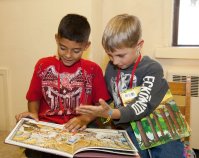Ditching the Reading Logs
Tracking minutes wasn’t helping her students, so a teacher asked them to instead discuss their reading every day, making it a social activity.
Your content has been saved!
Go to My Saved Content.After using reading logs in my fifth grade classroom for some time, I began to feel burdened by this daily routine. I noticed that students’ reading logs consistently showed the same number of minutes read each night: It was always 20. My students seemed to be reading merely because they had to—not because it opened up windows to the world, because reading about a character who looked like them brought them a sense of belonging and hope, or because they wanted to learn how to change the world for the better.
I sought to find out whether other teachers were feeling the same way and what research said about this issue. I found that many parents and educators had strong negative feelings about reading logs—and research supported those sentiments. In fact, one study found that mandatory reading assignments such as reading logs can actually decrease students’ motivation to read. After furthering my investigation through student interviews and parent surveys, I dropped the reading log in my classroom.
I experimented with several alternatives before developing reading accountability partners. Accountability partners meet every day to discuss the previous day’s reading. The practice may seem simple, but the results have been impressive.
Establishing Reading Accountability Partners
In this activity, every student needs a partner for conversations about their reading—and the pairing must be intentional. Students need to be paired with someone who will challenge them academically and encourage them emotionally. A prerequisite to setting up partners is knowing your students. Spend time thinking about student relationships within your classroom, observing students interacting with one another, and listening in on conversations to ensure that you pair students with someone they’re comfortable with—who can also hold them accountable.
Once you have established the pairs, provide mini-lessons to help students understand their role as a reading accountability partner—how they can hold a peer accountable for daily reading while being receptive to feedback. Model book talks and how to converse about reading, and give students time to practice these skills. Provide anchor charts and other visuals with helpful strategies that students can refer to during conversations.
Provide students with guiding questions to steer their conversations in productive ways. My students and I found that the following questions were helpful:
- What do you like best about your book?
- What feelings did this book evoke for you?
- Which character do you most closely relate to, and why?
- How have you been changed by what you read?
- Does your new understanding leave you feeling motivated to take any action?
You may choose to have some type of journal for students to record notes in. We also found it helpful to have a calendar where students were able to jot down notes each day about their reading and their partner conversations. They enjoyed being able to revisit previous days and months and reflect on all they had read and discussed—and how much growth they had made. Some students quickly recognized trends in their own reading, including which days they tended to read more at home; which, if any, genres they were stuck in; and when it was time to branch out and try new genres and authors.
Implementation
In order to set students up for success, I suggest giving them unrushed time every day to meet with their accountability partners and providing options for comfortable spaces to have conversations. In our fifth grade classroom, we found around 10 minutes of partner time to be adequate, though this might vary in different grade levels.
Work to ensure that the conversations are meaningful by making yourself present and “guest partnering” with students. Try to avoid stipulations or assigning grades or other metrics to their recreational reading and conversations. Let the purpose of this activity be to simply support students’ love of reading.
Anecdotal Evidence
One of my former fifth graders—let’s call her Ava—lacked confidence when it came to reading, but she possessed grit. She couldn’t imagine reading ever being fun for her, but was still willing to work hard. Her accountability partner motivated Ava to read more. Because of their commitment to one another, there were very few days when they came to school without having read the previous evening—and when they did, I would overhear them apologizing to each other for having let the other down.
With the accountability partners activity, Ava was able to experience success as a reader for the first time in her schooling—and she and her partner fostered a lasting friendship. Through conversations with her partner, Ava was empowered to try books she may have previously shied away from; she also met characters she could relate to and discovered stories she hoped would never end.
Academically, Ava experienced significant growth in our classroom—but more than that, she left my classroom with a love for reading and learning. Her mom came to me toward the end of the year and told me about the new confidence she had seen in Ava and how reading was now a favorite family activity.
